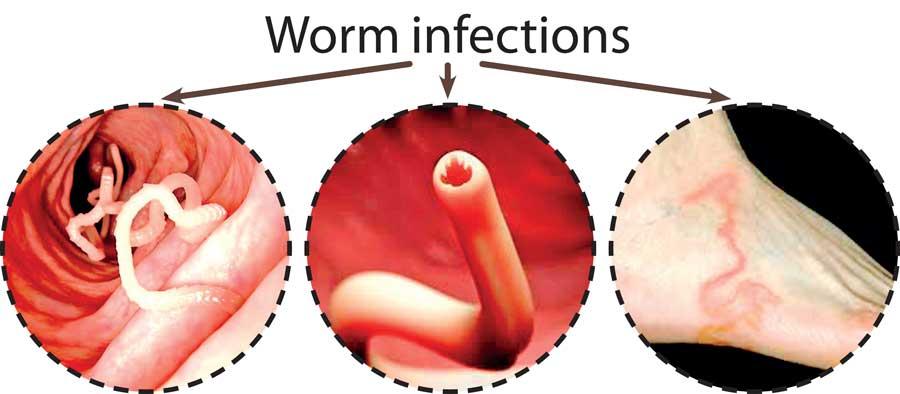27 Dec 2019 - {{hitsCtrl.values.hits}}

 Ever felt uncomfortable in your belly; an abdominal pain perhaps, that is hard to explain? Or maybe insomnia or a relentless itching that does not subside? The culprit could perhaps be a wriggling friend; in this case ‘worms’. Today’s topic for Health Capsule is based on worm infection and treatment. Joining us in discussion is Consultant Pediatrician at the Lady Ridgeway Hospital for Children, Dr. Deepal Perera who will take this opportunity to elucidate in detail concerning the types of worm infections, health risks and the treatment methods accompanied for the malady.
Ever felt uncomfortable in your belly; an abdominal pain perhaps, that is hard to explain? Or maybe insomnia or a relentless itching that does not subside? The culprit could perhaps be a wriggling friend; in this case ‘worms’. Today’s topic for Health Capsule is based on worm infection and treatment. Joining us in discussion is Consultant Pediatrician at the Lady Ridgeway Hospital for Children, Dr. Deepal Perera who will take this opportunity to elucidate in detail concerning the types of worm infections, health risks and the treatment methods accompanied for the malady.
Following are excerpts of the interview done with Dr. Perera.
Q How does a patient contract worm infection?
There are different methods of getting infected. Most of the infections are contracted through the mouth. The best example would be hand to mouth infection such as threadworms and roundworms, which are accompanied with eggs. The commonest mode of transmitting worm is through the worm eggs. Whipworms are one such mode of worms transmitted through eggs. Hookworms, on the other hand pierce through the skin. The best example of contracting the hookworm infection is when you walk outside without slippers. This is also known as ‘ground itch’. This is a very much prevalent even to this day.
Q What are the commonest worm infections prevalent? 
The worms can infect the human body.The roundworm, hookworm, whipworm and threadworm are the four commonest worms in Sri Lanka. In addition, we see tapeworms which are not very common in Sri Lanka. In addition there are filarial worms both human filarial worms and animal filarial worms.
The commonest worm infection in children these days is threadworms, seatworms and the second commonest is roundworms. Roundworms are long worms that can grow from few inches to 10 - 12 inches. Comparatively, other worms are small. Third commonest is hookworms and the fourth commonest is whipworms.
Q If a patient goes undiagnosed, could a worm infection result in being fatal?
Sometimes we see roundworms in the intestines. These worms which enter through the intestines, tend to invade the lungs. This holds the possibility of even causing death to the patient. Sometimes we see patients whose intestines are full of roundworms. Hookworms, on the other hand can cause anaemia or iron deficiency in the patient. Hookworms suck the blood and if found in the intestine, will cause the patient to become anaemic. When the level of haemoglobin is low, it can cause other complications in addition to anaemia and also hookworms could result in recurring infections in the patient. Another complication related to worm infection is intestinal obstruction, which may take place if the patient is not treated properly. If the condition aspirates to the lungs, it may become life threatening.
Q How common is it to observe the prevalence of worm infections in Sri Lanka, particularly cases of fatality?
Yes, such cases have been reported from Sri Lanka. Roundworms can aspirate into the lungs causing fatality. When I was a medical student, I had to dissect a body and I saw a lot of worms in the body of the deceased person. Even in recent times, we have observed quite a number of young children reporting to us with cases of worm infection on and off.

Q There is a myth that too much sweets could lead to worm infection. Is there any truth to this claim?
No, there is no truth to these claims. It is simply a myth. There is no connection between sugary food and worms. There is another myth that patients cannot follow a special diet when taking the drug Mebendazol. Now we can prescribe any diet along with worm treatment.
Q Is there any age group in particular that is vulnerable to worm infection?
Almost all children are vulnerable to contract worm infection from six months on wards up to ten years; especially thread worms. However, for the first six months there is resistance against infection due to infants depending on breast milk only. Even adults are vulnerable to roundworm, threadworm or hookworm infection.
Q How is a worm infection patient diagnosed based on symptoms?
There are certain initial symptoms, but the best way to make a diagnosis is through examining the stools to check if there are any worms or eggs. In the case of threadworms, they emerge in the outside of the anal area and lay eggs. A single threadworm is capable of laying approximately 10,000 eggs during its lifetime.
Abdominal pain and distention, cough, poor appetite and irritability are common symptoms related to worm infection. When it comes to a threadworm infection, a patient tends to feel itchiness around the anal area often. In the medical world, this is known as ‘Prutitus Ani’. Patients tend to scratch themselves often during night hours and even endure sleep disturbances as a result. In the case of hookworms, patients indicate symptoms such as ground itch where the patient will feel a strong itch on the sole and in interdigital spaces in the feet. We call it ‘ground itch’. Abdominal pain is a symptom common for both roundworms and hookworms.
In Filarial worms, we observe symptoms such as joint swellings, sometimes lumps and bumps in the body and swelling of limbs.
Q How are patients generally treated?
The treatment method for both children and adults are similar . We prescribe an anti-worm treatment known as Mebendazole or Pyrantel Pamoate. Unless there is a worm infection, which needs to be treated, it is not necessary to take these drugs. However, if one member in the family is affected by a worm infection, it is better to treat the whole family. The first dose can be given on the first day of the diagnosis itself; one tablet will be prescribed for the patient twice a day, which should be continued for three days. We generally prescribe Mebendazole. There is a second dose that should be administered after one week to the patient following the initial treatment. Otherwise, there is a chance that the eggs would hatch and give rise to worms again, thus creating the opportunity for the recurrence of the infestation. The whole family should be treated likewise.
Q Pregnant ladies are often prescribed worm treatment. How effective is it in suppressing the possibility of worm infection in the mother and child?
In the first trimester, we can prescribe Mebendazole for pregnant mothers. In the case of babies, we can prescribe Mebendazole after six months if the child is infected with a worm infestation. Mebendazole is an anti worm treatment that is effective in treating worm infection. Pyrantel Pamoate is another drug that can be used for treatment.
Q What take home message do you have for the public?
We see worm infestation and even there are cases of complications that we see often. Simply put, I suggest that it is always better to seek immediate medical care if someone suspects that he or she or one of their loved ones has taken ill due to a worm infection.
21 Dec 2024 5 hours ago
21 Dec 2024 21 Dec 2024
21 Dec 2024 21 Dec 2024
21 Dec 2024 21 Dec 2024
21 Dec 2024 21 Dec 2024